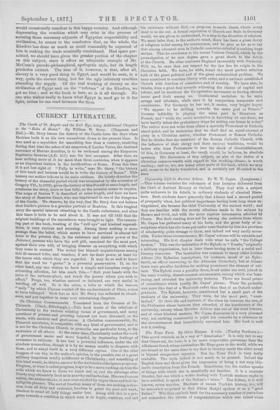On Christian Commonwealth, Translated from the German of Dr, Thiersch.
(Clark, Edinburgh.)—This book treats of the relations of Christianity to the various existing forms of government, and many questions of present and pressing interest are here discussed, on the whole, with candour and good-Ronne. A Christian commonwealth, Dr. Thiersch maintains, is compatible with any kind of government, and it is not for the Christian Church to prescribe one particular forms to the exclusion of all others. At the same time, Christianity makes the work of government easier and more hopeful, by implanting feelings of reverence in subjecte. It has had a powerful influence, under the old absolute monarchies, though it is by no means unable to dispense with them, and to adapt itself to a very different regime. One of the chief dangers of our day, in the author's opinion, is the possible rise of a great military despotism totally indifferent to Christianity; and something of this kind would, he thinks, answer to the Antichrist of Seripture prophecy. Progress, or what is called progress, is apt to be a mere rushing-on from the evils which we know to those we know not of, and the strivings after liberty may ultimately land us in anarchy and barbarism. His own German nation, the author thinks, is now o ver-o scited by vague ideas and half-in- telligible phrases. The sort of freedom many of them are seeking is free- a
an from all duty and restraint, freedom to grind the poor and weak, freedom to tread all holy things under foot, Along with this is a pro- gress towards a condition in which man is to begin, continue, and end
his existence without God,—e. progress towards chaos, whore every ideal is to die out. A formal separation of Church and State in Germany would, we are given to understand, be a stop in the direction of atheism. We must infer that, to the author's mind, there has been a great decay of religious belief among his countrymen, and he goes so far as to say that among educated won in Catholic countries unbelief is making huge strides. This he attributes to the recent Vatican Coupon, which by the promulgation of its now dogma gave a groat shock to the fabric of the Church. He often contrasts England favourably with Germany. With us, ho says that our respect for the law has its origin in the Christian faith, We have, he adds, found the most perfect solution both of the great political and of the great ecclesiastical problem. We have contrived to combine liberty with order, and a national established Church with freedom of conscience and of worship. We have also, he thinks, done a good deal towards adjusting the claims of capital and labour, and ho mentions the Co-operative movement as having already borne good fruit among us. Continental socialism is, he says, savage and atheistic, while ours is by comparison temperate and considerate. For Germany he has not, it seems, very bright hopes. "We appear to be drifting towards the same goal as Franco." German infidelity is playing the same part in literature as French, and "while the social revolution is knocking at our doors, we have hardly taken the preliminary stops for setting our house in older." The author does not write from either a specially Protestant or Catholic stand-point, and he maintains that we shall find an equal amount of piety in a Christian nation, whether Protestant or Roman Catholic. But he thinks that the members of the Roman Catholic Church, with the influence of their clergy and their ancient traditions, would be better able than Protestants to face the shook of disestablishment. Of this, in Germany at least, tho result would, ho believes, be absolute apoetacy. His discussion of this subject, as also of the duties of a Christian commonwealth with regard to the working-classes, is worth reading ; and so, too, are many other parts of his book, which wo may add, seems to be fairly translated, and is certainly not ill-suited to the time.






























 Previous page
Previous page